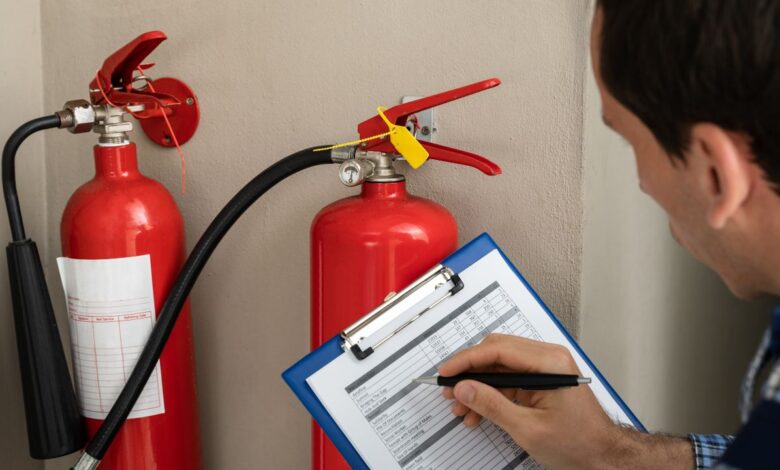Common Myths About Fire Risk Certification in London

Living in a bustling city like London, fire safety is paramount. As a landlord, ensuring your property adheres to fire regulations is not just a legal obligation, but a moral one. Fire risk assessments, followed by the appropriate certification, are crucial steps in achieving this. However, a surprising amount of misinformation surrounds fire risk certification in London. Here, we debunk some of the most common myths, empowering you to make informed decisions for your property and tenants’ safety.
Myth #1: Fire Risk Certification is Only for Commercial Buildings
This is a misconception. The Regulatory Reform (Fire Safety) Order 2005 mandates fire risk assessments for various types of properties, including:
- Residential buildings with multiple occupants (e.g., flats, shared houses)
- Businesses and workplaces, regardless of size
- Care homes and sheltered housing
- Hotels and hostels
- Buildings open to the public (e.g., shops, restaurants)
If you’re a landlord for any of these property types in London, a fire risk assessment is a legal requirement.
Myth #2: A Fire Risk Assessment is a One-Time Thing
Fire risk assessments are not a “set it and forget it” solution. Buildings and their usage evolve over time, necessitating regular assessments. Factors like new furniture, electrical appliances, or changes in occupancy require a reassessment. Additionally, fire regulations are subject to updates, so it’s crucial to ensure your assessment reflects current guidelines. Most experts recommend conducting a fire risk assessment every year, or more frequently in high-risk environments.
Myth #3: You Can Conduct Your Own Fire Risk Assessment
While there’s no legal requirement for a qualified professional to perform the assessment, it’s highly advisable. Qualified fire risk assessors possess the necessary expertise to identify potential hazards, assess risk levels, and recommend appropriate fire safety measures. They understand complex fire regulations and ensure your assessment meets all legal requirements. Their expertise can also save you money in the long run by identifying potential fire risks before they become costly problems.
Myth #4: Fire Risk Certification Guarantees Fire Safety
Fire risk certification signifies that, at the time of the assessment, your property met the minimum legal fire safety standards. However, it’s not a guarantee against fire outbreaks. Fire safety is an ongoing process. Implementing the recommended actions from the fire risk assessment and maintaining all safety equipment is crucial for upholding fire safety standards.
For landlords and property managers in London, obtaining a fire risk certificate is essential for compliance with fire safety laws. This certificate proves that the property has undergone a comprehensive fire risk assessment by a qualified professional. It highlights areas that need attention to reduce fire hazards and ensure the safety of the occupants. A fire risk certificate London provides peace of mind, knowing that the building is as safe as possible. Whether you own a single rental property or manage multiple buildings, keeping up with fire safety regulations is crucial to avoid penalties and ensure tenant safety.
Myth #5: Fire Alarms Are All You Need for Fire Safety
Fire alarms are undoubtedly vital fire safety components, but they’re not the only piece of the puzzle. A comprehensive fire safety strategy considers various factors:
- Escape routes: Ensuring clear and unobstructed escape routes for all occupants is essential.
- Fire extinguishers: Having the right type and number of fire extinguishers readily available is crucial for early intervention.
- Fire signage: Clear and well-placed signage is vital for directing occupants towards exits and emergency equipment.
- Fire safety training: Educating your tenants on fire safety procedures and the proper use of fire escapes and extinguishers can make a life-or-death difference in the event of a fire.
Myth #6: There’s Only One Type of Fire Risk Assessment
The complexity of a fire risk assessment varies based on the property type and its use. Here’s a breakdown of some common types:
- Low-risk assessments: Suitable for low-risk properties like single-occupancy dwellings.
- Standard assessments: For most commercial and residential properties with multiple occupants.
- Complex assessments: For high-risk environments like factories, hospitals, and schools, requiring in-depth evaluation from a qualified assessor.
Myth #7: Fire Risk Assessments Are Time-Consuming and Disruptive
Qualified fire risk assessors are experienced in streamlining the process. They conduct thorough assessments with minimal disruption to your tenants. Furthermore, a fire risk assessment and implementing preventative measures is an investment in the safety of your property and tenants, ultimately saving you time and potential financial losses from a fire incident.
Myth #8: Fire Risk Certification is Only for Council Properties
Fire risk assessments and certification are mandatory for all properties, regardless of ownership – private, council, or housing association.
Myth #9: You Can Just Ignore a Fire Risk Assessment
Failing to comply with fire safety regulations can have serious consequences:
- Fines: Significant fines can be imposed for non-compliance.
- Prosecution: In extreme cases, landlords can face criminal prosecution.
- Insurance issues: Non-compliance may void insurance coverage in the event of a fire, leaving you liable for significant financial losses.
- Tenant safety: Most importantly, ignoring fire safety regulations puts your tenants’ lives at risk.
Conclusion
Fire risk certification is not a luxury but a legal and moral obligation for property owners in London. While it may seem like a daunting task, it’s essential for protecting your tenants and ensuring your property complies with fire safety regulations. By dispelling common myths and understanding the importance of fire risk assessments, you can take proactive steps to create a safer environment for everyone. Remember, fire safety is not just a legal requirement but a commitment to the well-being of your tenants.





